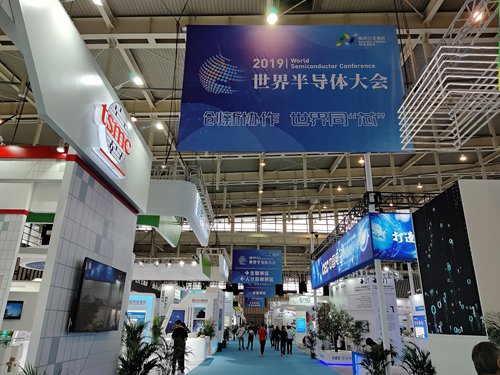Domestic semiconductor maker going public
By Shen Weiduo Source: Global Times Published: 2020/7/7 23:58:40
Move to accelerate R&D, self-reliance of China’s chip industry

The World Semiconductor Congress is held in Nanjing, capital of East China's Jiangsu Province in May in 2019. Photo: VCG
Chinese chipmaker Semiconductor Manufacturing International Corp (SMIC)'s fast-track listing and fundraising at Shanghai's Sci-Tech Innovation Board will not only accelerate the industry leader's research and development ability, but also mark the beginning of the fast development era of the country's semiconductors.
Domestic investors' enthusiasm to purchase shares of the firm shows that the whole country, from state-backed funds, major securities firms and individual investors are all supporting the chips-manufacturing sector. It is a welcome injection of confidence to Chinese tech firms that are coming because of intensified US technology sanctions, said analysts.
SMIC is estimated to have raised 46.29 billion yuan ($6.55 billion) in the Shanghai public offering, more than double its initial target of raising only 20 billion yuan. The company set the IPO price of its shares to be traded in Shanghai at 27.46 yuan each, it said in a filing to the Shanghai Stock Exchange on Sunday.
It makes the firm not only the largest IPO on the Shanghai Stock Exchange's NASDAQ-like STAR Market, but also the largest IPO in the A-share market in the past 10 years.
"SMIC's fast-track listing on the STAR Market is an explicit indication of the national push for a homegrown semiconductor manufacturing giant," an industry insider and close follower of China's stock market, told the Global Times on Tuesday.
Chinese regulators decided to fast-track the SMIC IPO, approving it on June 19 just two weeks after the company applied to go public. The process normally takes three to six months. In May, SMIC secured $2.2 billion of investment from Chinese state-run investors.
An analyst from a leading securities firm told the Global Times on Tuesday that with the expansion of leading chip makers such as SMIC, homegrown semiconductor materials herald a "golden era" in the coming years, leading to the development of the whole industry.
Founded in 2000, SMIC is the Chinese mainland's largest contract chipset manufacturer, and a key player in China's drive to develop a domestic semiconductor industry that will relieve its reliance on foreign supplies, especially amid the US' intensified crackdown on Huawei Technologies.
SMIC said in its previous prospectus that it would use 40 percent of its planned 20 billion yuan fundraising to ramp up production of 12-inch wafers in its massive Shanghai plant. It said another 20 percent would go to research and development of advanced technologies.
Analysts said the higher than expected fundraising figure will give SMIC a much-needed shot in the arm to speed up research and development into producing 7-nanometer chips.
With the capital injection, SMIC could march into the production of 7-nm and even 5-nm wafers in the coming three years, Ma Jihua, a veteran industry analyst, told the Global Times Tuesday.
Xiang Ligang, an industry analyst, told the Global Times that an important reason why SMIC's technology advance has been slow in the past years was the lack of customers. If Huawei and other Chinese tech firms shift production capacity to SMIC, there will be a major breakthrough in research and development and production capacity.
Meanwhile, US firms which lost major customers like Huawei and the vast China market, will only face a declining income, a cut in research investment, said industry analysts.
However, the chip-making industry is not only cash-burning and also time-consuming, said industry analysts, noting that the path to self-reliance still faces major barriers such as a still comparatively lower rate of material localization and lower demand globally amid the global economic contraction.
Posted in: COMPANIES